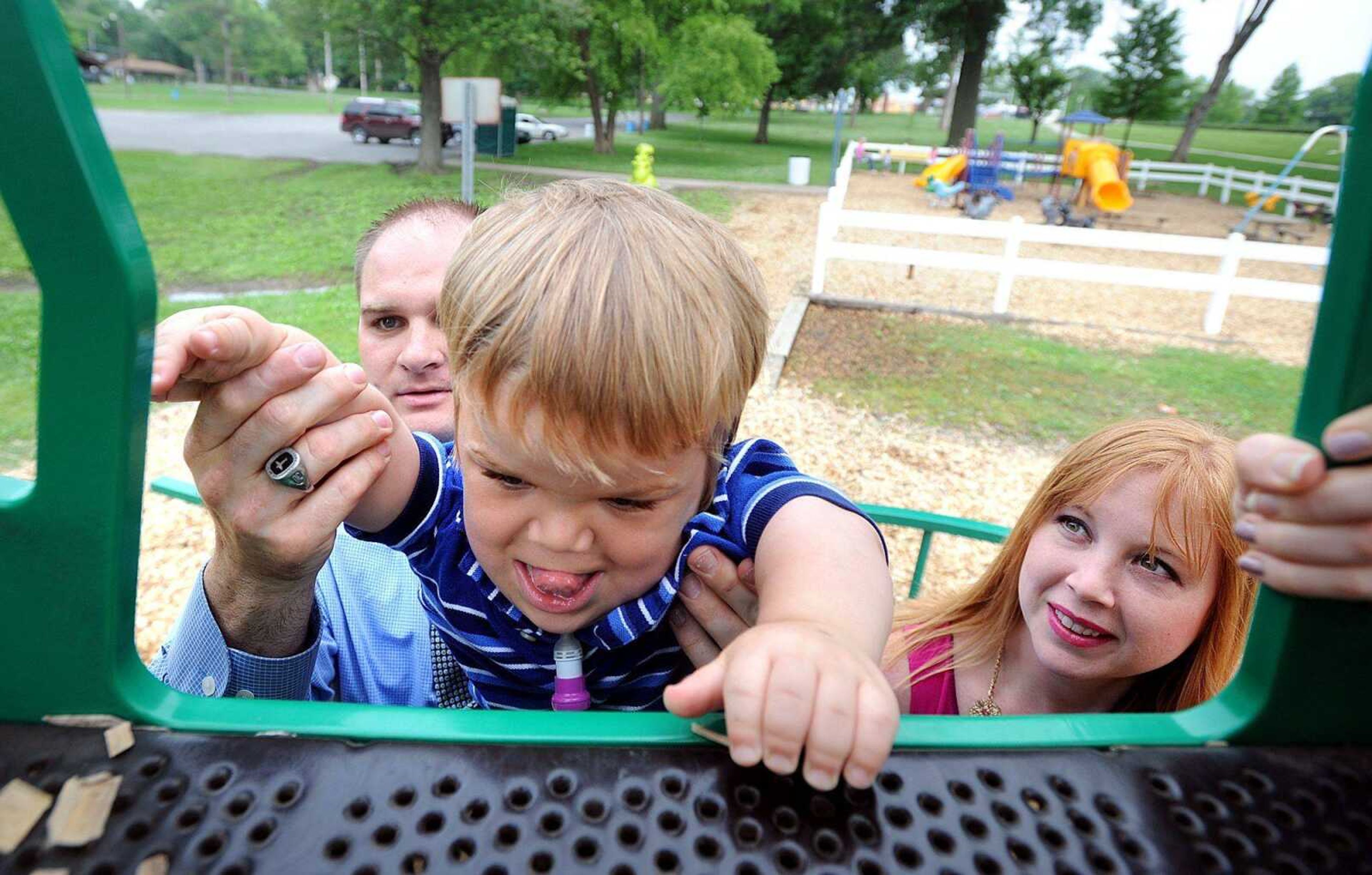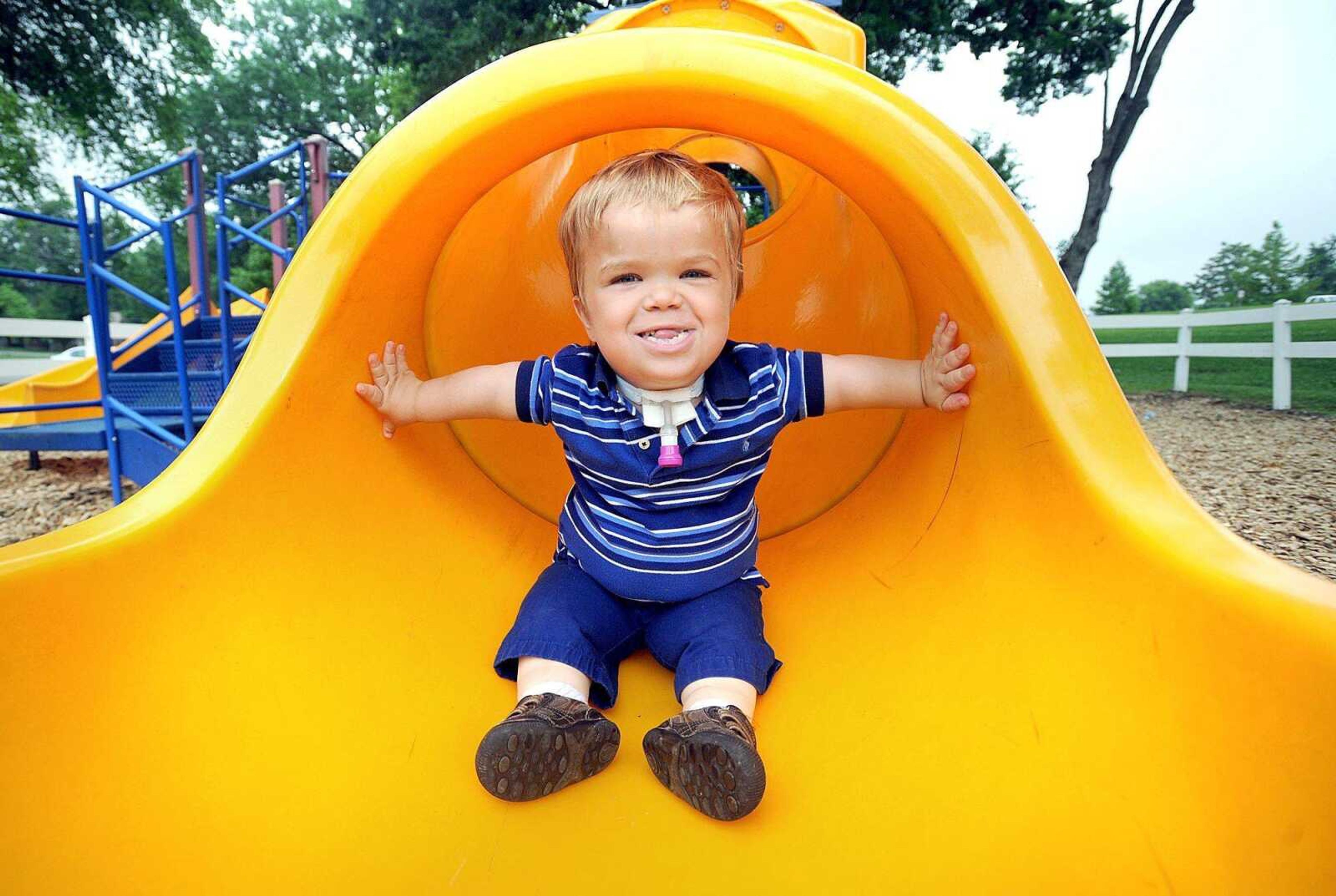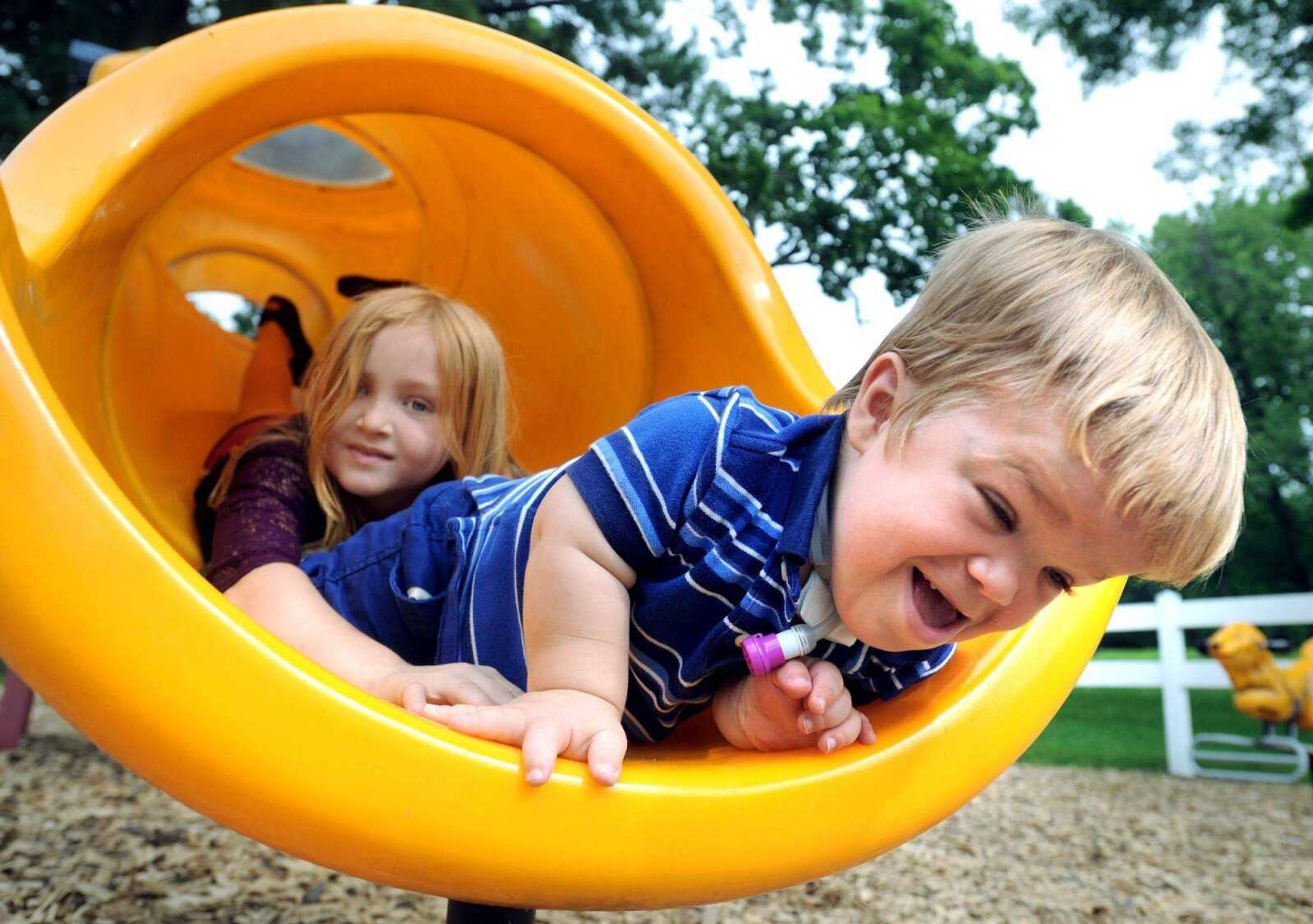Just breathe: Jackson family adjusts to child's dwarfism
Brimming with cheeky swagger, Izaac Pursley sits atop the little red scooter trike he's dubbed Porcupine. "Race you to Mom," he dares in his husky little-boy voice and zips toward his mother, big sister Evee-Kay jogging gamely beside him. "I win!" he declares, scooting past his parents, Sheree and Dr. Greg Pursley of Jackson. Sheree shakes her head as Izaac sticks out his tongue, cranks out a textbook three-point turn, and motors off toward the jungle gym, shouting, "It's easy for me!"...
Brimming with cheeky swagger, Izaac Pursley sits atop the little red scooter trike he's dubbed Porcupine.
"Race you to Mom," he dares in his husky little-boy voice and zips toward his mother, big sister Evee-Kay jogging gamely beside him.
"I win!" he declares, scooting past his parents, Sheree and Dr. Greg Pursley of Jackson. Sheree shakes her head as Izaac sticks out his tongue, cranks out a textbook three-point turn, and motors off toward the jungle gym, shouting, "It's easy for me!"
"He's such a hambone," Sheree says with a smile.
It's a cool Thursday afternoon and the Pursleys look to be having as much fun as any of the other families wandering around Capaha Park in Cape Girardeau, but none of the other families' children is on life support.
Six-year-old Izaac was born with a form of dwarfism, and resulting complications have stunted his growth and damaged his lungs. He needed a tracheotomy before he was a year old and uses a ventilator to pump oxygen into his too-small chest when he sleeps at night.
The Pursleys keep a big blue suitcase in the back of the family minivan complete with oxygen tank, ventilator, carbon dioxide monitor, medications and gauze. Greg carries a suction unit in a bag slung over his shoulder in case mucous plugs off Izaac's trachea tube.
"The only emergency equipment we don't carry with us wherever we go is a defibrillator," explains Sheree.
Yet somehow, as Izaac scrambles headfirst up a yellow tube slide and Evee-Kay dangles by her knees from the monkey bars, the Pursleys demonstrate how they have learned to manage Izaac's precarious medical condition without losing their ability to enjoy typical family activities.
"We're like ducks," Sheree says. "On the surface, we have fun. But at the same time, underwater we're kicking like crazy. We as parents realized that we had to take on the extra burden and worry so that [our children] could focus on living as normally as possible."

Izaac was born May 12, 2008. Sheree says the pregnancy was uneventful. The ultrasound at 25 weeks showed a normally proportioned baby boy. The scheduled C-section delivery went smoothly.
"If anything, the pregnancy was easier than it was with Evee-Kay," she says.
So she and Greg were understandably surprised when the doctor came in and told them Izaac most likely had achondroplasia, a form of dwarfism. His upper limbs were a bit shorter than average, and he had an extra finger on each hand and an extra toe on each foot.
Greg and Sheree were shocked. Neither of them carried a genetic predisposition, but it turned out Izaac's condition is caused by a mutation that can happen late in the third trimester, the chances of which are one in 50,000.
The couple didn't know what would be in store for a child with dwarfism, or what was in store for them as the child's parents. But looking down into the bassinet at the way Izaac's skin bunched up around his short upper arms, they tried to stay optimistic. He looked like a narrow-chested bodybuilder. They nicknamed him "Michelin Man."
Then the complications started. A sleep apnea test revealed the oxygen levels Izaac maintained on his own were dangerously low. None of the doctors would agree to quantify Izaac's chances of survival. Greg and Sheree had to watch as their newborn was repeatedly intubated to help him breathe and restrained so he couldn't remove the breathing tube.
"They called him 'Baby Houdini' because of how he was strapped down," Greg recalls. "And how he would wiggle out of [the straps] and try to grab the tube."
Chronic pneumonia had caused permanent damage to Izaac's lungs, and at 9 months old, he received a tracheotomy. Greg and Sheree agonized over the decision before concluding it was best for him.
"The thing about the first year was that it was shock after shock," Greg says. "Every new thing was a surprise."
On top of the medical drama, Greg had to tend to his fledgling chiropractic business, which meant he often was stuck in Cape Girardeau while Sheree and Evee-Kay stayed in St. Louis with Izaac during his treatments. Greg visited on weekends and kept a journal in the meantime.
Using his journals as source material, he wrote a book titled "A New Kind of Normal," detailing Izaac's ordeal and the family's parallel struggle to support him and each other. It's the story of how they learned to appreciate one another in the midst of unthinkably stressful circumstances.
"I feel like we have a compelling story," Greg says. "Not just because of Izaac's condition, but because 85 percent of all marriages that have a special-needs child end in divorce, but somehow we were able to grow closer together instead of tearing each other apart."
The book will be available at Barnes & Noble and Hastings, where Greg is scheduled to hold book-signings as well. He says he hopes others will draw inspiration from the book and apply the principles he's learned to their own lives. He'd like to be able to share his story at speaking engagements too. He attributes the strength of his relationship with his wife to their ability to cultivate four guiding principles: faith, selflessness, communication and trust.
Through six years and hundreds of close calls, Greg and Sheree have acclimated to the stress that such vigilance brings, but it hasn't been easy. Izaac regularly has difficulties breathing, which means he requires constant supervision.
"The most stressful part is how quickly things go bad," Greg explains. "He can be fine one minute, but if he 'plugs off,' it's an emergency within 15 seconds."
The ability to respond at the first sign of trouble is key. At the playground, Sheree watches Izaac reach the top of the slide. When he turns around, panting triumphantly, she notices something. Her tone rises slightly; still even, but charged with a certain calm urgency.
"Izaac, can you cough?"
He continues to pant, so Sheree calls to the top of the slide again.
"Izaac. Cough."
He clears his throat, breathes a little easier and slides back down without a care. Sheree and Greg relax; another potential episode avoided. They've learned how to handle such situations with poise.

But it's meant having to sacrifice travel, something Greg and Sheree love to do. Two and a half years ago, they visited Anna, Illinois, leaving Izaac and Evee-Kay with a nurse and their neighbors. When Izaac stopped breathing and had to be rushed to the hospital, they received a nightmare phone call.
"They said, 'Izaac's not breathing,' and then put down the phone, and we could hear them trying to resuscitate him," Greg recalls. "It was the first time we tried to take a trip alone. And also our last. We were traumatized."
Now they take trips to the park, where they can see Izaac make faces at his sister and revel in being a surprisingly rough-and-tumble 6-year-old. Like other children his age, Izaac can get crabby, but at times like these he's an inspiration. As his medical condition slowly improves and the Pursleys continue to get better at managing it, Izaac has begun to focus on the less-dire struggles of living with dwarfism, such as learning the tricks to dressing himself.
"He's had all this stuff happen to him, but he's still an extremely happy kid," Greg says.
A kid who loves the Cardinals, and -- to his parents' horror -- a kid who figured out how to pop a wheelie on Porcupine if the grade of the hill is just right. When he starts first grade at North Elementary in Jackson in the fall, he still will need the big blue suitcase and a nurse will accompany him throughout the day, but these things are just part of life now. Things Izaac coughs at and shrugs off.
He's a competitive little guy. And so far, he's winning, hands down.
tgraef@gmail.com
Connect with the Southeast Missourian Newsroom:
For corrections to this story or other insights for the editor, click here. To submit a letter to the editor, click here. To learn about the Southeast Missourian’s AI Policy, click here.










